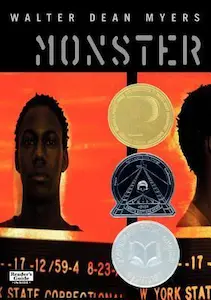Monster - Summary
Walter Dean Myers

Introduction
In the book “Monster” by Walter Dean Myers, the reader is taken on a gripping journey through the eyes of Steve Harmon, a sixteen-year-old African American boy who finds himself on trial for felony murder. Set in New York City, the novel explores themes of identity, justice, and the power of perception. Through the use of a unique narrative structure, Myers creates a thought-provoking and emotionally charged story that raises important questions about the nature of guilt and innocence.
The Story Unfolds
The novel opens with Steve Harmon, an aspiring filmmaker, documenting his experience in a journal format. As the story progresses, Steve’s journal entries are interspersed with courtroom transcripts, screenplay-like scenes, and his own personal reflections. This multi-layered narrative style allows the reader to gain a deeper understanding of Steve’s thoughts and emotions, as well as the events leading up to the trial.
A Portrait of Steve Harmon
Steve Harmon is a complex and relatable protagonist who struggles to maintain his sense of self amidst the chaos of the trial. As a young black man in America, Steve faces societal prejudices and stereotypes that threaten to define him as a “monster.” Throughout the book, he grapples with his own identity and wrestles with the question of whether he truly deserves to be labeled as a criminal.
The Power of Perception
One of the central themes in “Monster” is the power of perception and how it can shape reality. As Steve navigates the courtroom, he becomes acutely aware of how others perceive him. The prosecutor portrays him as a cold-blooded criminal, while his defense attorney attempts to humanize him. Through these contrasting perspectives, Myers highlights the subjective nature of truth and the impact it can have on the outcome of a trial.
The Justice System Under Scrutiny
Myers also shines a critical light on the flaws within the justice system. As Steve observes the trial proceedings, he becomes increasingly disillusioned with the way justice is served. He witnesses the manipulation of witnesses, the dehumanization of defendants, and the power dynamics that often favor those in authority. Through Steve’s eyes, the reader is forced to question the fairness and impartiality of the legal system.
The Power of Art
Throughout the novel, Steve finds solace in his passion for filmmaking. He uses his camera as a way to process his emotions and make sense of the world around him. Myers explores the transformative power of art and how it can provide a voice for the voiceless. Through Steve’s lens, the reader is reminded of the importance of creativity and self-expression, even in the face of adversity.
The Weight of Guilt
As the trial progresses, Steve’s guilt or innocence hangs in the balance. The reader is left questioning whether he played an active role in the crime or if he was simply in the wrong place at the wrong time. Myers skillfully keeps the reader guessing, using suspense and ambiguity to create a sense of unease. This uncertainty forces the reader to confront their own biases and preconceived notions about guilt and innocence.
The Impact of Choices
“Monster” also explores the consequences of the choices we make. Steve’s involvement with a group of individuals who commit a robbery ultimately leads to his arrest and trial. Through his character, Myers highlights the importance of personal responsibility and the far-reaching effects that one decision can have on a person’s life. This serves as a cautionary tale, reminding the reader of the importance of making thoughtful and ethical choices.
The Importance of Empathy
Throughout the book, Myers encourages the reader to empathize with Steve and the other characters involved in the trial. By presenting multiple perspectives and humanizing each individual, he challenges the reader to look beyond the surface and consider the complexities of their lives. This emphasis on empathy serves as a reminder of our shared humanity and the importance of understanding one another.
Conclusion
In “Monster” by Walter Dean Myers, the reader is taken on a thought-provoking journey through the eyes of Steve Harmon, a young African American boy on trial for felony murder. Myers skillfully weaves together themes of identity, justice, and the power of perception to create a compelling narrative that challenges the reader’s assumptions and beliefs. Through Steve’s story, we are reminded of the importance of empathy, personal responsibility, and the transformative power of art. “Monster” is a gripping and emotionally charged novel that leaves a lasting impact on its readers.